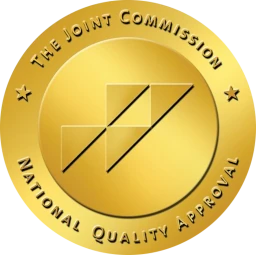Recreate Behavioral Health of Ohio in Gahanna, Ohio knows taking the first step is brave. Just outside of Columbus, our state-of-the-art facility provides medical care for those experiencing withdrawal symptoms. We combine medical expertise with understanding, knowing every person’s journey is different.
Key Takeaways
Alcohol dependence can cause alcohol withdrawal.
- Alcohol withdrawal can be life-threatening if not properly managed. Symptoms like seizures, delirium tremens, and cardiovascular complications require immediate medical attention to ensure safety.
- Professional management is needed to navigate the physical changes that happen during withdrawal which can vary from person to person.
- The withdrawal process involves brain chemistry changes, particularly with GABA and glutamate systems, and requires medical expertise.
- The severity of symptoms depends on individual factors: length of time and intensity of use, overall health, and previous withdrawal experiences.
Why Treatment Matters
Medical supervision means complications are caught and managed early, reducing risk and discomfort.
Comprehensive care addresses the physical and psychological aspects of withdrawal and lays the foundation for long-term recovery.
Ongoing recovery support, including counseling and aftercare planning, is key to long-term sobriety and overall health.
Alcohol Withdrawal Syndrome
Alcohol withdrawal syndrome is a range of symptoms that occur when someone with a history of heavy drinking stops drinking or reduces drinking significantly. These symptoms can range from mild withdrawal symptoms like anxiety and tremors to severe withdrawal symptoms like seizures and delirium tremens.
This is a symptom of alcohol use disorder, a condition that affects millions. The severity of symptoms depends on the individual’s history of alcohol abuse, overall health, and presence of other substance abuse. Most individuals with alcohol use disorder will experience withdrawal symptoms if they stop drinking suddenly.
What is Alcohol Withdrawal
Alcohol withdrawal is one of the most medically serious forms of substance withdrawal. When someone who has developed alcohol dependence stops their alcohol intake or reduces drinking significantly their body goes into a complex and potentially dangerous state of physical adjustment. Understanding this process is important for patients and loved ones. Withdrawal symptoms can range from mild to severe or complicated withdrawal, that’s why professional care is key.
The Science Behind Alcohol Withdrawal – What Happens in the Brain
–
Neurological Effects
The human brain has a delicate balance of neurotransmitters that control everything from mood to bodily functions. Chronic alcohol exposure causes GABA receptors to become less responsive, leading to tolerance and requiring higher alcohol intake for the same effects. Chronic alcohol use disrupts this balance in several ways:
1. GABA System
Alcohol increases the effect of GABA (gamma-aminobutyric acid), the brain’s main inhibitory neurotransmitter that calms the nervous system. Over time the brain reduces its natural GABA production and becomes dependent.
When alcohol is removed the brain has a GABA deficit, the nervous system becomes hyperactive. This hyperactivity can cause anxiety, tremors, and withdrawal seizures.
2. Glutamate System
To counteract the depressive effects of alcohol the brain increases the production of glutamate, an excitatory neurotransmitter. When alcohol use stops this excess glutamate activity causes overstimulation of the nervous system.
This overstimulation is responsible for many withdrawal symptoms including insomnia, irritability, tremors, and delirium tremens.
Physiological Adaptations
Long-term alcohol use forces the body to adapt:
1. Cardiovascular System
Alcohol affects blood pressure regulation and the body becomes dependent on it to maintain normal levels. During withdrawal, blood pressure can fluctuate wildly and increase the risk of cardiovascular complications.
Irregular heartbeats and increased heart rate during withdrawal puts extra stress on the cardiovascular system, needs to be monitored closely.
2. Endocrine System
Hormonal balances change dramatically. Long-term alcohol use disrupts hormonal balance and affects stress response systems like cortisol production. This dysregulation causes stress and mood swings during withdrawal.
Metabolic processes including blood sugar regulation are also affected which can cause fatigue and irritability.

The Progressive Nature of Alcohol Withdrawal
Symptoms of alcohol withdrawal may peak between 24 to 72 hours after the last drink.
Mild Symptoms – Early Stage (6-12 Hours After Last Drink)
The early stage of alcohol withdrawal usually starts with mild symptoms that can be mistaken for general discomfort:
- Mild anxiety and restlessness: People feel edgy or uncomfortable as their body adjusts to not having alcohol.
- Slight tremors in hands: These can start mildly but can get worse if not addressed.
- Blood pressure changes: Withdrawal can cause blood pressure to fluctuate, and needs to be monitored closely.
- Increased heart rate: The cardiovascular system reacts to not having alcohol and the pulse increases.
- Gastrointestinal discomfort: Nausea and abdominal pain can start early in the withdrawal process.
- Sleep disturbances: Difficulty falling or staying asleep is common as the body tries to rebalance
More Severe Withdrawal Symptoms – Intermediate Stage (12-48 Hours)
As withdrawal gets worse symptoms get more intense and new symptoms can appear:
- Pronounced tremors: Shaking gets more obvious and daily activities become difficult.
- Severe anxiety: Fear and panic can dominate, sometimes with irritability.
- Increased blood pressure: Hypertension gets worse and increases the risk of cardiovascular complications.
- Confusion and disorientation: Brain fog and difficulty concentrating are common as the brain adjusts.
- Profuse sweating: The body’s response to stress causes excessive sweating which can lead to dehydration if not managed.
- Potential hallucinations: Visual or auditory hallucinations can occur especially in severe cases and add to psychological distress.
Severe Alcohol Withdrawal Symptoms – Critical or Acute Stage (48-72 Hours)
This is the highest risk for severe complications and needs immediate medical attention:
- Delirium tremens (DTs): A life-threatening condition characterized by severe confusion, agitation, and hallucinations. Delirium tremens can occur between 48 to 72 hours after the last drink and can last up to 3 to 4 days.
- Alcohol withdrawal seizures: Seizures can occur suddenly and intensely during this stage and need emergency attention.
- Severe cardiovascular events: Hypertension and irregular heartbeats can lead to cardiac arrest or stroke if not treated.
- Extreme confusion: Patients can be completely disoriented or unaware of their surroundings.
- Life-threatening complications: Without proper care ,symptoms can escalate fast and can be life threatening.

Alcohol Withdrawal Treatment at Recreate Behavioral Health of Ohio
–
Ohio’s Medical Expertise
At Recreate Ohio we have treatment plans designed for the specific needs of alcohol withdrawal. After completion of detoxification, a step down to residential treatment is often requested by patients. Outpatient treatment may be viable for people with mild to moderate alcohol withdrawal symptoms.
Assessments
- Our team does a full assessment to determine the severity of alcohol withdrawal syndrome and any underlying medical conditions. The CIWA-Ar scale is commonly used to assess the severity of alcohol withdrawal symptoms.
Treatment Protocols
- We develop individualized plans that include medications to manage withdrawal symptoms, hydration therapy, and psychological support.
24/7 Monitoring
- Our facility provides around the clock care for severe or complicated withdrawal symptoms to ensure patient safety at every stage.
Aftercare
- After detox we focus on recovery planning, relapse prevention and therapy to address alcohol use disorder and its underlying causes.
Our Philosophy
At Recreate Ohio we are driven by two core principles:
Medical Expertise
We stay up to date with the latest research and incorporate it into our treatment protocols. Our methods are based on evidence based approaches that are tailored to address alcohol withdrawal symptoms and complications. We continuously evaluate our processes and outcomes to refine our approach to provide the best care possible with our main goal to achieve measurable and sustainable improvements in our patients health and well being.
Patient Focused
Individualized Treatment Planning focuses on the individual’s unique journey with customized plans that addresses their specific needs, preferences and circumstances. We also involve Family in the recovery process when possible and educate them to support. Our approach is culturally sensitive and respectful of diverse cultures and values. We also focus on Long Term Recovery.

Medical Approaches
–
Medications
Our medical team uses a variety of medications to manage withdrawal:
Benzodiazepines (benzos) are commonly used in alcohol withdrawal because of their multiple benefits. They help prevent seizures which is a common and life threatening complication of withdrawal. They also help with anxiety and agitation that occurs during withdrawal stages and provides relief. Benzodiazepines also manage physical symptoms like shaking and tremors that occur during mild and complicated withdrawal. The administration of these medications is closely monitored and dosages are adjusted to prevent over sedation while managing withdrawal symptoms.
Patients with mild withdrawal symptoms can often be treated without specific pharmacotherapy.
Supportive medications including anti-seizure medications to stabilize the nervous system and prevent severe neurological complications can be used. Blood pressure management medications to regulate hypertension and reduce cardiovascular strain if needed. Nutritional supplements to address deficiencies common in long term alcohol abuse such as thiamine and folate deficiencies. Hydration therapy to replenish fluids and alleviate severe symptoms, maintaining hydration is helpful for overall recovery.
Monitoring
We follow a strict protocol:
Vital signs are monitored to ensure patient safety and prevent complications. Blood pressure checks are done regularly to catch any fluctuations that can be life threatening. We also monitor heart rate to catch arrhythmias and other cardiac issues early. Temperature checks are done early to address infections or complications. Respiratory rate is monitored to maintain stable breathing patterns especially during withdrawal.
Neurological status is assessed regularly including mental status exams to catch any changes in cognition or mood that may need intervention. Tremor is monitored to adjust treatment and seizure monitoring to catch any signs of neurological instability. Cognitive function is tracked to measure progress of recovery.

Risk Factors in Alcohol Withdrawal Treatment
–
Medical Complications
Some factors increase the risk:
Physical Health
- Liver Disease: Long term alcohol use can damage the liver severely and affect its ability to process medications and manage toxins. Abnormal liver function makes alcohol withdrawal treatment and management more complicated.
- Cardiovascular Problems: Pre-existing heart conditions like hypertension or arrhythmias increases the risk of complicated alcohol withdrawal. More severe symptoms need to be evaluated during alcohol detox. Inpatient treatment for alcohol addiction is recommended for common symptoms surrounding cardiovascular issues.
- Nutritional Deficiencies: Long term alcohol abuse can cause deficiencies in essential nutrients like thiamine (vitamin B1) which can lead to Wernicke’s encephalopathy if not treated.
- Previous Withdrawal Experiences: Individuals with history of withdrawal complications like seizures or delirium tremens are at higher risk of severe symptoms during subsequent detox attempts.
Mental Health
Co-Occurring Disorders
- Anxiety and Depression: Mental health conditions often coexist with alcohol use disorder and worsens withdrawal symptoms and treatment.
- Trauma History: Past trauma can intensify psychological withdrawal symptoms like severe anxiety, agitation or hallucinations
Dual Diagnosis
Individuals with both a substance use disorder and a mental health condition need integrated treatment to address both conditions at the same time.
Special Populations
Some groups need special care:
Elderly Patients have complex medical needs due to multiple health conditions and slower recovery time. Older age is a factor that can increase the severity of alcohol withdrawal symptoms. The complexity of their care is compounded by medication interactions and need detailed attention to their treatment plan. Challenges arise as older adults have multiple health conditions and slower metabolism, making withdrawal management more complicated. To address these challenges, treatment is tailored to minimize stress to the body, with extra monitoring to manage medication interactions and slower recovery time.
Dual Diagnosis individuals need integrated treatment that addresses both mental health and substance use disorder. This involves specialized medication management and complex recovery planning that takes into account their unique needs. Extra monitoring is also needed to ensure their safety and well being during the recovery process.
Alcohol withdrawal in pregnant women is risky for both the mother and the baby, including preterm labor and fetal alcohol syndrome. So special care is needed to ensure the health and safety of both mother and baby. This collaborative approach often involves obstetrician and addiction specialist working together to provide comprehensive support during withdrawal.

Frequently Asked Questions
How long does alcohol withdrawal last?
Acute phase is 5-7 days, post-acute symptoms can last weeks or months. Prolonged withdrawal symptoms can include insomnia and mood changes. Every individual’s timeline varies depending on drinking history and overall health.
Can I detox at home?
Self detox from alcohol is very dangerous and potentially fatal. Medical supervision is required due to risk of complications like seizures and delirium tremens.
What’s dangerous about withdrawal?
Alcohol withdrawal can cause seizures, heart problems and delirium tremens. These can be life threatening without proper medical management.
Do I need treatment after detox?
Yes, long term recovery requires continued support through various forms of treatment, therapy and support groups after the initial detox period. Complete abstinence from alcohol is recommended as the best treatment following alcohol withdrawal.
How do you handle severe withdrawal?
Severe cases get intensive medical monitoring, carefully managed medication protocol and immediate intervention for any complications. Our facility can handle all levels of withdrawal.
Disclaimer
This is for educational purposes only and not a substitute for professional medical advice. If you or someone you know is experiencing alcohol withdrawal symptoms get medical help now.
Remember: Alcohol withdrawal can be deadly. Never try to detox from alcohol without medical supervision. At Recreate Behavioral Health of Ohio we’re here to guide you through this process with expertise, care and compassion.









